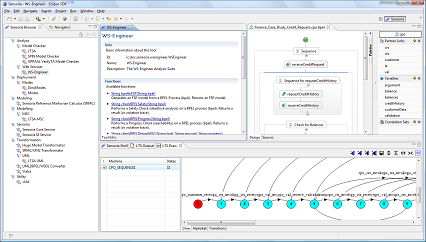|
SDE - SENSORIA Development Environment SDE is an Eclipse-based development environment for service-oriented software, which supports, through integrated tools, service modelling, analysis, code generation, and runtime functionality. The SDE itself is based on a Service-Oriented Architecture, allowing easy integration of tools and querying the platform for available functionality. The tools hosted in the SDE are installed and handled as services. The SDE allows developers to automate workflows as an orchestration of integrated tools, to use formal tools without requiring them to understand the underlying formal semantics, and to use automated model transformations which translate between high-level models and formal specifications.  SDE and several installed tools The following tools for the development of SOA systems, including formal analysis tools, have been integrated into the SDE as Eclipse plug-ins.
- MDD4SOA - A suite of transformations enabling a model-driven development process based on UML4SOA models. MDD4SOA consists of a set of Eclipse plugins which directly work on UML4SOA models, creating executable code for the Web Service standards family (BPEL, WSDL, XSD), the Java programming language, and the Jolie SOA orchestration language. Furthermore, the suite contains transformations for adding UI support to BPEL processes, and the generation of deployment artefacts for industry standard application servers.
- SRMC - The plug-in is a software tool that supports the stochastic process algebra PEPA allowing quantitative analysis of systems. SRMC/ UML complements SRMC translating a subset of UML2 models (interactions and state machines) into an SRMC description for performance evaluation. Results are reflected back into the UML model.
- CMC - Model checker and analyser of abstract behavioural properties for systems defined by interacting UML statecharts, which are textually represented (COWS process algebra). Allows to generate abstract fulltrace minimized graphs of the system.
- UMC - Model checker and analyser of abstract behavioural properties for systems defined by interacting UML statecharts, which are represented in umc format. Allows to generate abstract full-trace minimized graphs of the system.
- LTSA WS-Engineer – supports cross-cutting mechnical analysis of service compositions (design, interactions, choreography, deployment) to ensure safety.
- Service Modes – ssupports analysis of service mode models for adaptive and dynamic service composition.
- Dino Service Modes – supports mechanical generation of Dino Broker runtime specifications from service mode models for use with the Dino Broker tool.
- Dino Broker – supports runtime discovery and brokering of services using requirements and capabilities specifications for required and offered service specifications.
- SOA2WSDL Transformer – takes high level UML4SOA models and produces WSDL output.
- UML2Axis Transformer – takes high level UML4SOA models and produce WSDL, WS-ReliableMessaging, WS-Security and Apache Axisspecific configuration files as output.
- LYSA Static Protocol Analyzer – provides prototype LYSA editor to assist users in the modelling of security protocols and to verify properties related to secrecy and authentication.
- VIATRA2–is a live transformation framework that has been implemented, based on the incremental pattern matching engine of VIATRA which support the development of event-driven transformations. The novel model transformation by example approach has been developed to enable high-level specification of model transformations by the definition of typical input-output model parts. This tool is also part of an official Eclipse project.
|
